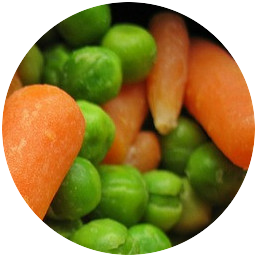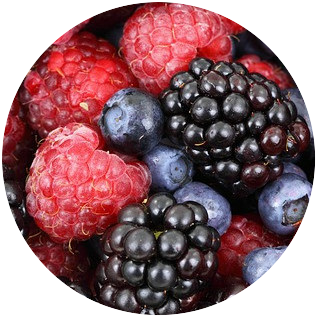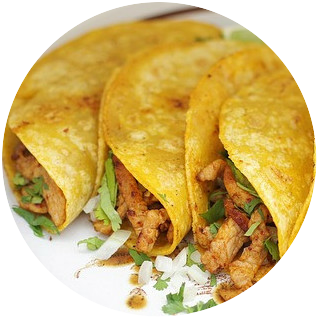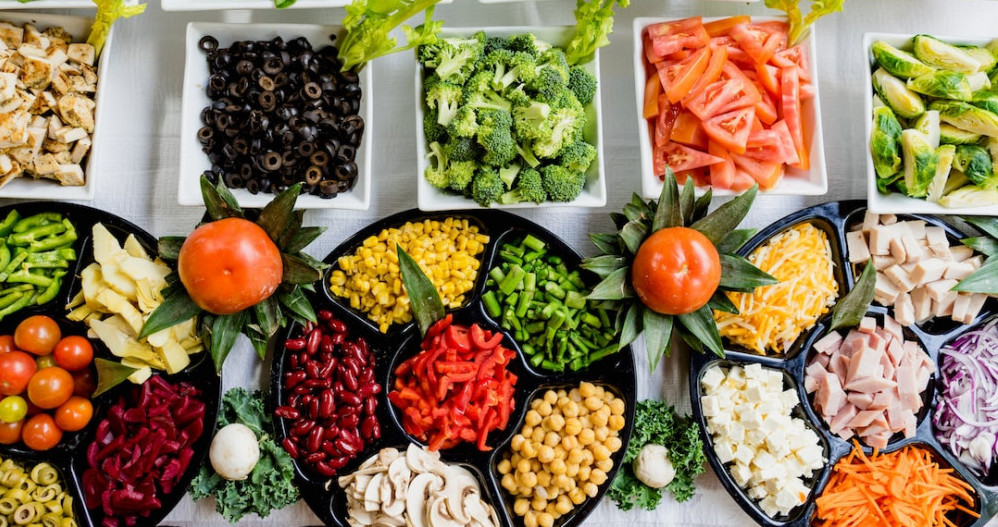I realize, in my previous post with the title “Easy Healthy Eating Plan,” I didn’t actually give you a meal-by-meal, day-by-day plan for 7 days, 14 days, etc. So if you were looking for that, we’re not going there – at least not at the moment.
What I do want to do in this post is to talk briefly about some of the cornerstone foods that might be a part of an easy diet plan – some that I’ve come up with – then look briefly at an expert-recommended approach.
List of “Cornerstone” Foods
Here is a list of healthy, simple, and inexpensive “cornerstone” foods that I’ve thought of, not in any particular order. You can add to these with a little imagination! I’ve also added nutritional/health comments after each one:
- Sweet potatoes – high in Vitamins A, C and potassium
- Russet potatoes – good source of potassium
- Onions – good for heart health, blood sugar control, bone density, lots of antioxidants
- Spinach – skin, hair and bone health, lower cancer risk, help with diabetes, lots of vitamins and minerals
- Broccoli – eye health, heart health, possible cancer prevention, lots of fiber, C, K, potassium
- Rice (preferably brown) – lots of fiber and B-vitamins, potassium, calcium, manganese
- Peas – fiber, antioxidants, may protect against heart disease and cancer

- Corn, including popcorn and corn tortillas – insoluble fiber, B-vitamins, zinc, magnesium, copper, iron, manganese
- Whole grain products (including bread) – fiber, Vitamin B, iron, folate, potassium, magnesium
- Oatmeal – weight loss, lower blood sugar, reduced risk of heart disease, vitamins, minerals, fiber, antioxidants
- Canned tomatoes – fiber, Vitamins A and C, the antioxidant lycopene
- Carrots – promote eye, skin, hair, bone health, reduce cancer risk, boost immunity, lower cholesterol
- Celery – alkalizing effect, rich in vitamins and minerals, supports digestion, lowers inflammation, important antioxidants
- Cabbage – heart healthy, may lower blood pressure, Vitamins K and C, may lower inflammation, improve digestion
- Squash – Vitamins A, C and B, potassium, magnesium, manganese, rich in fiber, good for digestion, plus antioxidants
- Beans – canned or dried – fiber, protein, healthy weight maintenance, diabetes control, iron, magnesium, potassium
- Lentils – canned or dried – can lower blood pressure, cholesterol, may protect against breast cancer
- Bananas – support digestive health, help you feel full, support heart health, lots of antioxidants and nutrients
- Oranges – boost immune system, lots of vitamins A and C, protects cells, slows macular degeneration
- Apples – antioxidants that may protect cell DNA, prevent cancer cells from growing, aid weight loss, stomach and brain health
 Frozen berries – blueberries, raspberries, strawberries, mixed berries – antioxidants, improve blood sugar, high fiber, other vitamins and minerals – “one of the healthiest foods on earth”
Frozen berries – blueberries, raspberries, strawberries, mixed berries – antioxidants, improve blood sugar, high fiber, other vitamins and minerals – “one of the healthiest foods on earth”- Canned mackerel (a steal for the nutritional value!), canned tuna, canned salmon, canned sardines – protein dense, omega-3 and omega-6 fatty acids, vitamins D and B-12, choline, iron, iodine, iron, selenium
- Chicken breast – low-fat protein, builds and protects muscle mass, strengthens bones, reduces appetite, boosts seratonin and melatonin, good source of selenium
- Cottage cheese – good source of calcium, may help prevent prostate cancer, more digestable than ordinary milk, help promote weight loss
- Greek yogurt – similar to cottage cheese with lower sodium, better protein source than ordinary yogurt
- Almonds (and probably other tree nuts) – healthy fats, fiber, protein, magnesium, Vitamin E, promotes weight loss, lots of antioxidants, lower inflammation, assist in blood sugar control, may help prevent metabolic syndrome
- Eggs – complete protein, nutrient dense, lower trigycerides, lower odds of a stroke, heart healthy, help good cholesterol
And there are more! Plus – remember – I am not in any way a medical doctor or medical expert, so I take no responsibility for anyone having any kind of negative reaction to any of these foods! I have simply gleaned this information and summarized it here for you.
“Cornerstone” Combinations for Complete Protein – Vegans
It’s worthy of note that for vegans and vegetarians in particular, combinations of certain of the above foods can provide complete protein! And it seems, according to sources, that they do not have to be eaten together, but as a part of the overall diet.
First, here are a few complete protein plant foods:
- Quinoa
- Soybeans
- Buckwheat
- Hempseed
- Blue-green algae
Here are some complete protein combinations – that apparently, from information I’ve gleaned, do not need to be eaten together, but as part of one’s overall diet:
- Nuts or seeds with whole grains

- Nut butter on whole wheat toast (example)
- Whole grains with beans
- Beans and rice
- Hummus and pita
- Tortillas and refried beans
- Beans with nuts or seeds
- Chickpeas and sunflower seeds
Several additional cornerstone foods have been added – quinoa and sunflower seeds, for example! These are also super-nutritious…
On a Official Note…
Here are a few suggestions that “experts” (and I’m not one, remember) have mentioned, to point you in the direction of just general good healthy eating. This is likely the dietitian-approved approach and way of saying it! While working toward a simple, healthful, and inexpensive diet, these suggestions are worth keeping in mind.
- Drink lots of fluids!
- Water, tea, coffee, and other drinks without sugar.
- Talk about the ultimate inexpensive, simple and healthy addition to your diet! – how can you beat water?
- Experts recommend anywhere from half a gallon to a gallon of water daily.
- And no matter how much you drink, it is not going to add appreciably to your water bill!
- Stay away from processed foods!
- Processed foods are not simple. Have you checked the ingredients list on that cake mix or snack food?
- They are simple only in this way, that they are very easy to buy and eat!
- You pay a lot for loads of salt, sugar, and preservatives – which are terrible for your health.
- Eat a variety of different foods.
- Vegetables, fruits, grains, protein, dairy, and oils.
- Doesn’t all have to be at the same meal – simplicity, simplicity, simplicity!
- Don’t overeat.
- “Eat only when you’re hungry, and only eat until you are not hungry.” That works for weight loss – and is probably a great idea, even if you are not trying to lose weight.
- Get exercise!
- Not a food – but hey, also has many health benefits!
In the End…
From here, take your imagination and ingenuity and run! Take the foods mentioned above – and add more! An amazing world of nutritional powerhouses, they don’t require vast amounts of time to prepare, and are not expensive!
If you have any questions or comments on this article, please feel free to share!

